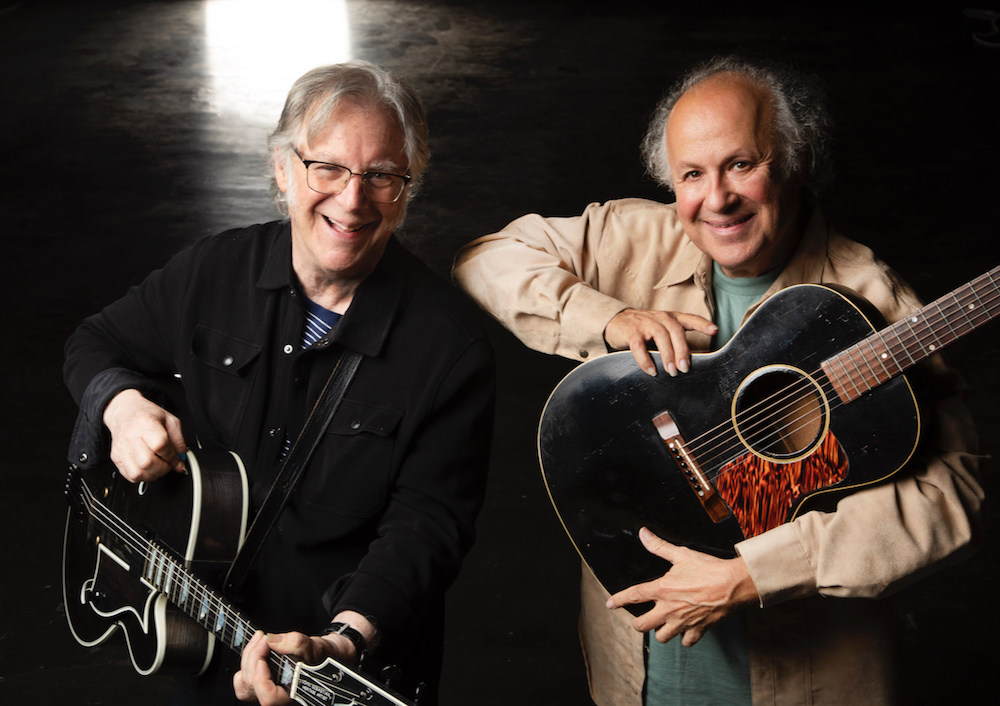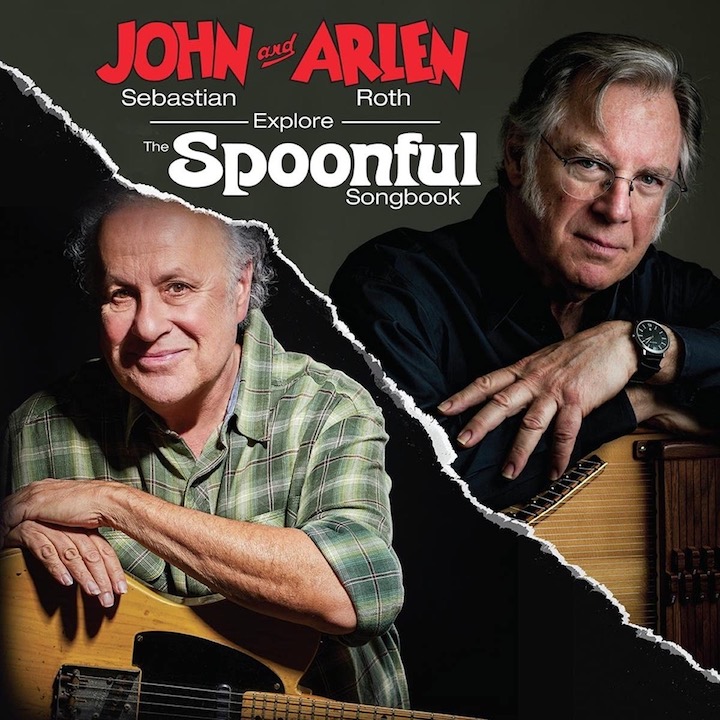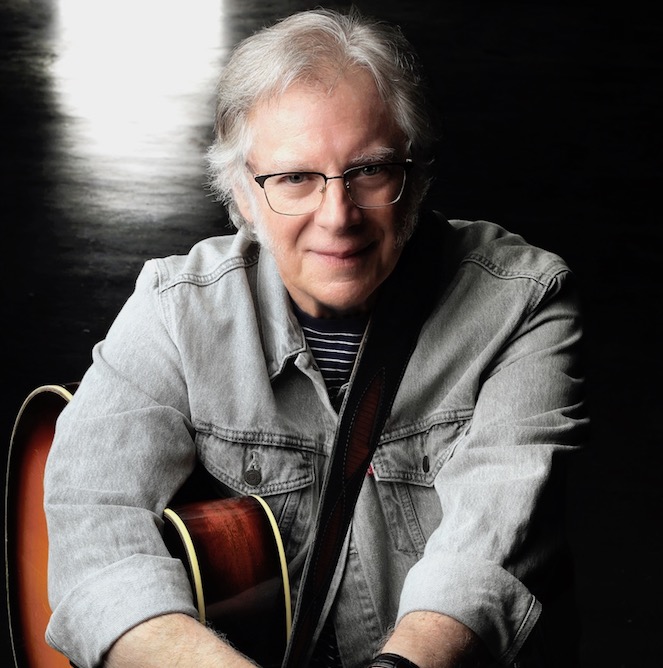The Lovin’ Spoonful cofounder, who composed some of the greatest hit singles of the 1960s, talks about his childhood, his songwriting, the Woodstock festival, his new album, and more.
Bright spots permeated AM radio in the late 1960s, but none shone brighter than the songs of John Sebastian and the group he co-founded, the Lovin’ Spoonful. They produced a long string of classic 45s over a short span, starting with 1965’s “Do You Believe in Magic?” and “You Didn’t Have to Be So Nice,” both of which reached the Top 10. Then, in 1966, they really took off, scoring five more Top 10 smashes with “Daydream,” “Did You Ever Have to Make Up Your Mind?,” “Summer in the City” (which made it to No. 1), “Rain on the Roof,” and “Nashville Cats.” In 1967, they had still more hits with “Darling Be Home Soon,” “Six O’clock,” and “She Is Still a Mystery,” while the Critters enjoyed some success with a memorable rendition of their “Younger Girl.”
Sebastian composed all these numbers himself except for “Summer in the City” and “You Didn’t Have to Be So Nice,” for which he respectively shares songwriting credits with his brother Mark and the Spoonful’s Steve Boone.
The original Lovin’ Spoonful – who were inducted into the Rock & Roll Hall of Fame in 2000 – broke up in 1968. The following year, Sebastian went to Woodstock as a spectator but wound up being drafted to perform. He issued several solo albums in the 1970s when he kept busy as a session player and performed on such classic albums as Crosby Stills Nash & Young’s Déjà Vu and the Doors’ L.A. Woman. He also scored a chart-topping hit in 1976 with “Welcome Back,” his theme song for TV’s Welcome Back Kotter.
Since then, he has kept busy with a variety of projects, including concerts, work for Broadway, and assorted studio sessions but has kept a relatively low profile. Now 77, he has recently issued his first album since 2007. Called John Sebastian & Arlen Roth Explore the Spoonful Songbook, it finds him and his longtime guitarist friend Arlen serving up wonderfully laid-back renditions of many of the aforementioned classics along with such other Lovin’ Spoonful favorites as “Jug Band Music” and “Stories We Could Tell,” a high point from Sebastian’s solo career that has been covered by the Everly Brothers and Tom Petty.
Joining Sebastian and Roth on the set are bassist Ira Coleman and drummer Eric Parker as well as Sebastian’s son, Benson, who supplies percussion, and Arlen’s daughter, Lexi, who adds vocals on “Didn’t Want to Have to Do It.” Others lend a hand as well, including Maria Muldaur, and her ex-husband Geoff Muldaur. Mona and Lisa Wagner, Austrian sisters who perform as the MonaLisa Twins, help brighten four tracks with their vocal harmonies.
Sebastian talked with me via Zoom on January 11 from Woodstock, New York, where he lives with his wife of 50 years, photographer Catherine Sebastian. A condensed and lightly edited transcript of our conversation follows, along with excerpts from the video of our talk and some songs from the new album.
Everyone from Burl Ives to Woody Guthrie to [I Love Lucy costar] Vivian Vance passed through your life when you were a child. Are there people who had a particularly large influence on you back then?
I’d have to say Viv, who was sort of my Aunt Viv before she was a national, and eventually international, figure. I think I was kind of a stand-in. She never had children. Her best friend was my mom, and after she’d been really naughty and brought me something I shouldn’t have, Viv would often say to my mother, “Ah, Jane, come on. When he grows up, he’s gonna like me better!”
I read that your grandfather didn’t want your father to go into music, but that pattern apparently didn’t repeat with you and your father. How did your parents react to your music and success?
Well, my dad often said, “I can’t believe it. He always lands on his feet!” And that was the most backhanded compliment because I couldn’t please him as a student or any of those kinds of ways that a traditional Italian male garners approval.
How accurate is the scene painted in [the Mamas and Papas’] “Creeque Alley”? Were you really passing the hat?
What they’re referring to is a particularly wonderful basket house, Charlie Washburn’s Third Side [Coffeehouse on Bleecker Street in Greenwich Village], that I played. And I would always have latter-life jokes with Richie Havens because Richie would come into these basket houses and just put out this energy and sweat and just tear that guitar up and – remember nobody knows anybody [at this point] – then someone would say, “Come on, Sebastian, come up with something [to top that].”
Were you surprised when the Lovin’ Spoonful started having hits or were you confident that that was going to happen?
There was a certain confidence borne of the combination of [producer] Eric Jacobson and [lead guitarist, singer, and Spoonful co-founder] Zal Yanovsky. It was just mounting. Steve Boone suddenly gives us a kind of a [Boston-area washtub bassist] Fritz Richmond–like foundation. Joe Butler provides background vocals that we really didn’t have. And so, it was a mounting kind of confidence.
But we were turned down by every record company in New York that Eric Jacobson could get to. And I mean, sometimes it was “Do You Believe in Magic?” that the guys were turning down. And we would always say, “See, of course they don’t get it. They want the Philadelphia boys. They want a whole other thing.” That was how we showed our overconfident selves.
There was a warmth and playfulness to all the Spoonful’s hits, but every song was different—you never knew what to expect. I assume that was deliberate. I wonder whether you got any pressure from Kama Sutra [the Spoonful’s label] to try to recycle a winning formula.
Never. Never got any pressure like that. I don’t know whether they understood that we were deliberately…our game was that we wanted to sound like a different band with every single.
We’re any of those early songs – like “Younger Girl” and “Did You Ever Have to Make Up Your Mind?” – based on real-life experiences?
Yes, very often. I don’t know if I’m that creative to come up with that stuff without a stimulus.
Most of those songs are lyrically if not musically upbeat but “Didn’t Want to Have to Do It” is really sad and melancholy. Where did that one come from?
You know, that was probably the first complete song that I ever wrote. And that came out of real life. It was kind of a realization that this particular relationship [wasn’t going to last]. And it wasn’t all romantic. There was a child involved.
What about “Younger Generation”?
That came about from a conversation I had with Bob Cavallo, our manager at the time, who is still a friend. He and I were both speculating about what our kids are gonna think of where they’re landing. Sometimes you suddenly see a song open up, like here’s the whole three minutes—boom. That was one of those songs. It came out very fast.
Do you think that generation gaps are caused because parents can’t live up to their dreams, as the song says?
Yeah, parents can’t live up to their dreams. That’s true. [Laughs.]
You used a lot of sound effects – the traffic in “Summer in the City,” the cash register in “Money” –and there’s a full orchestra on “Darling Be Home Soon.” I assume all those things were added later but were the basic tracks usually laid down live in the studio or was there a lot of overdubbing?
Yes, the basic track was laid down and then [on “Darling Be Home Soon”] the orchestra was there already. That [song] was one day’s work. Were we up to maybe six tracks? I don’t know if we were up to eight tracks yet.
I’ve heard you tell the story of Woodstock a million times, so I’m not going to ask you how that all happened.
Good, good!
But on stage at Woodstock, you were talking about how amazing it all was, and it certainly seemed that way then. I’m wondering how you look back on it now, though, after Altamont and the Yippies and the death of the hippie movement. Do you see it differently?
You know, humans can ruin everything. It was a wonderful moment. I wish it could last forever, and it does in the hearts of the people that were really involved…and it doesn’t in a lot of people that followed.
You released more than half a dozen solo albums in the seventies, but you’ve issued only five since then, including the new album, which is your first since 2007. I know you’ve been musically active in other ways but why fewer solo studio albums?
Less good ideas.
Let’s talk about the new album. How did you pick the songs? I’m wondering, for example, why you chose the relatively obscure “Four Eyes” but not “Summer in the City,” the only No. 1 hit for the Spoonful, or “Six O’clock,” which made the top 20.
“Summer in the City,” we had a pretty good version. But it was pretty good as compared to the hit, which is a fantastic three and a half minutes. So that got nixed. [We included] “Four Eyes” because me and Arlen loved playing it. A lot of those songs, the choice came about very naturally because we’d be sitting down, two guitarists face to face, and coming up with things.
Mostly, when we were working with four people, we were able to work live. I’m thankful to the heavens that we were actually done with those 14 tunes [before the pandemic] and then the only thing to do was [add finishing touches]. “Would you just put your harmonica on this song?” Or, “Would you just add that wonderful Telecaster thing you do?” And that could happen in our respective…not home studios but studios that are right nearby.
I was surprised at how much I like the instrumentals on the album, but they’re all songs that have terrific lyrics, so why did you decide to skip the vocals on those?
Well, it was the other way around. We started by saying, “This is just gonna be an instrumental album. And then I think we were cutting “Lovin’ You,” and Arlen said, “Why don’t you sing it?” OK, we’d sing it, and we’d say, “Hey, that’s sort of better.” There were a few more that happened the same way.

You’ve got a big songbook. Is there a possibility that you’ll record a volume two, with songs that didn’t make it onto this album?
You know, there’s a few songs that I have to get Arlen to play because it would definitely add to it.
You once hosted a TV show about the sixties called The Golden Age of Rock ’n’ Roll.
Yeah, wow! [Laughs.]
Do you in fact see that decade as the golden age? And if so, why do you think subsequent decades haven’t been as good for music?
Money came more into it and created a different demand. The music business exploded. I remember when Peter Frampton’s Frampton Comes Alive was the first platinum album and how all of us sort of sixties guys were going, “Wow!” We were fighting and clawing for that gold. [Laughs.]
Your career has incorporated everything from jug band to doo-wop. Is there a genre that’s closest to your heart?
You know, I can’t say that it’s one single thing. Some of those old jug-band tunes with the wonderful harmonica or the lyrical mandolin that [country blues artist] Yank Rachell played… they have their own reason for being. And it isn’t all the lyric or the melody – it’s a cumulative thing, and that’s marvelous. And those albums that Phil Spector was making with the Ronettes… to me, that was something singular, the same as the Staple Singers’ [1959 album] Uncloudy Day.
What music are you listening to now?
Let’s see, I’ve been listening to Eddie Diehl, a wonderful jazz guitarist and also a miraculous fret man, which is why I had a long-running conversation with him, helping me with my instruments. Catherine [Sebastian’s wife] has been listening to the Chi-Lites. Haruomi Hosono has been on the machine a lot. He’s a really unique guy who sometimes calls himself Harry the Crown and he was kind of the Japanese sixties guy. He and I are almost the same age, and he did a whole disco phase as Yellow Magic Orchestra. A very creative guy.
You did an interview recently with Jeff Tamarkin at BestClassicBands.com, and you told him you’d never write a memoir, partly because it would sound like an apology. What did you mean by that?
Oh, just that the only thing anybody remembers is, “Oh, the Spoonful…didn’t they get busted and turn in their dealer?” [Boone and Yanovsky were arrested on marijuana charges in 1966 and were pressured into introducing an undercover cop to partyers, one of whom was arrested.] Oh, thank you for 50 years! Still climbing that ladder, and I still have to do that interview.

How do you feel about musicians speaking out about political issues?
Well, I think it’s an individual choice, and also it relates to what kind of music you are coming up with. I don’t know if I really fit the bill in the same setting as Phil Ochs and Bob Dylan and that crowd. Also, I have to face the fact that, you know, I’ve had a wonderful life. I’ve had an easy life. I haven’t been presented with some of the challenges that are faced by my pals.
Your music isn’t political, but do you ever talk about politics onstage?
You know, I always thought that I was not doing that. And I happened to mention the Lovin’ Spoonful and Supremes tour on a southerly stage somewhere, and I mentioned how Diana Ross had made the joke onstage, “Didn’t I sleep with you on a school bus in Alabama?” And what it was was that we of course were often sleeping on the school bus to get to the next town; it wasn’t a marvelous encounter or anything. And I had a guy come up to me [after the concert] and say, “Look, you shouldn’t do politics – don’t be political.” And I had to go, “Where in what I just did for two hours was political?” So, who knows what is political? It may not be overt but odd things become political.
I want to ask you about [the late folk singer/songwriter] Fred Neil [with whom Sebastian frequently performed in the mid-1960s]. Do you have strong memories of him and were you surprised when he quit the music business?
I have very strong memories, and I was hurt when he pulled back so far that I couldn’t call him and say hi. And I know that it was because to him I represented the threat of work. And he didn’t like the Italian work ethic at all that me and Felix Pappalardi were presenting to him at the time. But I think it was a wonderful combination while we had that going.
I know you’ve been asked many of the same questions repeatedly, so my last question – which you’ve probably also been asked – is: Are there questions you’re tired of hearing or ones you wish you were asked but never were?
Well, let’s see: “How about that Woodstock? What was that like?” That’s kind of like a “Where do I start?” kind of question so I am tired of it, and I think I’ve answered it as accurately and fully as I can. So, there is a moment of, “Gee, couldn’t you have researched this a little better?” when I hear that same question coming at me.
The question that I don’t get…what would that be? “What are you going to do with your next award?”
That’s a question you wish you were asked?
No, I don’t have any awards. I’m not an awards-type guy.
JOHN SEBASTIAN AND ARLEN ROTH EXPLORE THE SPOONFUL SONGBOOK IS OUT NOW WHEREVER YOU LISTEN TO MUSIC! KEEP UP WITH JOHN BY CHECKING OUT HIS WEBSITE.
Jeff Burger’s website, byjeffburger.com, contains five decades’ worth of music reviews, interviews, and commentary. His books include Dylan on Dylan: Interviews and Encounters, Lennon on Lennon: Conversations with John Lennon, Leonard Cohen on Leonard Cohen: Interviews and Encounters, and Springsteen on Springsteen: Interviews, Speeches, and Encounters.



